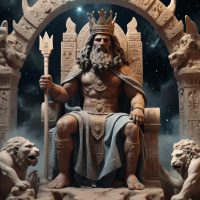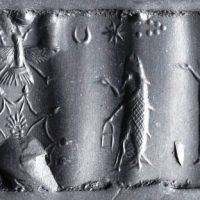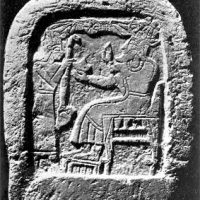Alalu : King of Gods
Listen
At a glance
| Description | |
|---|---|
| Origin | Hurrian Mythology |
| Classification | Gods |
| Family Members | N/A |
| Region | Turkey, Syria, Iraq, Iran |
| Associated With | Supreme Powers |
Alalu
Introduction
Alalu, often referred to as Alala or Alal, stands as one of the earliest divine figures in Hurrian mythology and the wider Near Eastern cosmological tradition. Recognized as the first ruler among the gods, his story is most notably preserved in the Kumarbi Cycle—a collection of Hurrian myths later adapted by the Hittites. Alalu’s reign marks the beginning of a celestial lineage, introducing the recurring theme of divine succession that would influence later mythologies across cultures. Overthrown by Anu, the sky god, and cast into the underworld, Alalu represents both the origins of cosmic order and the inevitable downfall that accompanies divine authority. His myth mirrors similar succession tales in Greek mythology, such as the overthrow of Uranus by Cronus and Cronus by Zeus, revealing the deep cultural interconnections among ancient civilizations.
Physical Traits
Ancient texts do not provide a physical description of Alalu, leaving his appearance to interpretation. As a primordial being associated with the early stages of creation, he is imagined as an immense and ancient force rather than a fully anthropomorphic deity. Some scholars suggest that, as the first god-king, he may have been visualized in early iconography as a regal, elder figure—symbolizing authority, stability, and age-old power. Given his connection to the chthonic realm after his defeat, he might have been perceived as a god of the underworld, embodying the dark, hidden forces of the earth. In reliefs at sites such as Yazılıkaya in Anatolia, primeval gods like Alalu are portrayed in shadowy or symbolic forms, emphasizing their timeless, elemental essence rather than their individuality. Alalu thus bridges the abstract and the physical—less a man than a manifestation of the ancient cosmos itself.
Family
Alalu’s position in the divine genealogy varies across Hurrian and Mesopotamian traditions. In the Hurrian narrative, Alalu is the first king of heaven, ruling for nine years before being overthrown by his cupbearer, Anu. This act of rebellion inaugurates the mythic cycle of divine succession that continues with Kumarbi and eventually leads to the birth of Teshub, the storm god. In some interpretations, Alalu is considered the father or ancestor of Kumarbi, linking him to a divine lineage that spans heaven, earth, and the underworld. Certain Mesopotamian texts associate him with Belili as a consort, suggesting a familial aspect to his mythic identity. This generational sequence—Alalu to Anu to Kumarbi—symbolizes the transformation of the cosmos from primal disorder to structured hierarchy, reflecting the ancient worldview that creation is born through conflict and succession.
Other names
Alalu appears in ancient sources under several variant names, including Alala, Alal, and Alalus. These variations reflect the spread of his worship and myth across linguistic and cultural boundaries from Hurrian to Hittite and Mesopotamian contexts. In Greek accounts, he was equated with Hypsistos, meaning “the Most High,” a title reserved for supreme or primeval deities. The multiplicity of names demonstrates how Alalu’s story transcended local traditions, adapting to new languages and theological frameworks while retaining his essential role as the first divine monarch. Some scholars also propose linguistic connections to ancient Semitic roots, though the etymology remains debated and uncertain. Regardless of form, his name came to symbolize the beginning of cosmic governance and the cyclical nature of divine power.
Powers and Abilities
Alalu’s greatest power lies in his sovereignty over the heavens and his role as the originator of divine kingship. His reign represents the establishment of cosmic authority before the universe took on its later structure. Unlike later gods associated with specific natural domains, Alalu’s power was absolute and undefined—a reflection of primordial chaos and creative potential. His rule, though brief, set the precedent for celestial order, and his fall symbolized the transformation of power rather than its extinction. When Anu dethroned him and banished him to the underworld, Alalu’s influence persisted in the chthonic domain, linking him to hidden energies of the earth, fertility, and death. In mythic terms, his defeat gave rise to regeneration and the emergence of new gods, echoing the ancient belief that creation emerges from destruction. This cyclical renewal forms the philosophical core of the Kingship in Heaven myth, where every fall becomes the foundation for new beginnings.
Modern Day Influence
Though Alalu’s cult faded with the decline of the Hurrian and Hittite civilizations, his legacy endures in comparative mythology and modern reinterpretations of ancient cosmologies. Scholars recognize him as one of the earliest expressions of the “primordial king” archetype—a deity whose authority predates the structured pantheons of later eras. His myth provides a blueprint for the succession narratives that appear in Greek, Roman, and even biblical traditions, where divine conflict shapes the cosmos. The parallels between Alalu, Uranus, and other dethroned gods reveal how deeply the Hurrian concept of cosmic kingship influenced Mediterranean and Near Eastern thought.
In the realm of popular culture, Alalu’s story has found renewed attention in speculative and pseudo-historical writings, particularly in modern theories surrounding the Anunnaki and extraterrestrial origins of civilization. Authors such as Zecharia Sitchin have reinterpreted Alalu as an exiled ruler from the planet Nibiru, though such ideas remain unsubstantiated by archaeology or linguistics. Despite their speculative nature, these interpretations highlight humanity’s enduring fascination with ancient gods as symbols of lost knowledge and cosmic mystery.
Contemporary artists and writers have also drawn inspiration from Alalu’s tale, portraying him as a tragic, exiled monarch whose downfall marks the birth of a new world order. In digital art, mythological encyclopedias, and academic studies, Alalu continues to serve as a symbol of transformation—the old yielding to the new. His myth remains a cornerstone for understanding the philosophical and spiritual worldview of the ancient Near East, where even the mightiest gods were bound by the cycles of time, power, and renewal.
Ultimately, Alalu’s story is more than an account of divine succession; it is a reflection of how early societies understood the nature of authority and cosmic balance. His reign and downfall represent the eternal rhythm of creation and decay that governs both gods and mortals. Through his myth, the Hurrians articulated one of the earliest expressions of cosmic order—a theme that would echo through centuries of storytelling, theology, and human imagination.
Related Images
Source
Bachvarova, M. R. (2016). From Hittite to Homer: The Anatolian Background of Ancient Greek Epic. Cambridge University Press.
Britannica. (2025, July 27). Alalu | Anatolian god. Retrieved from https://www.britannica.com/topic/Alalu
Encyclopedia.com. (2025, October 3). Hurrian religion. In Environmental Encyclopedias. Retrieved from https://www.encyclopedia.com/environment/encyclopedias-almanacs-transcripts-and-maps/hurrian-religion
Metcalf, C. (2021). The Gods Rich in Praise: Early Mesopotamian and Hurrian Mythology. Oxford University Press.
Polvani, A. M. (2018). Studies in Hurrian and Hittite Mythological Cycles. Brill Academic Publishers.
Wikipedia IPFS. (2020, September 13). Alalu. Retrieved from https://en.wikipedia-on-ipfs.org/wiki/Alalu
World Mythos. (2024, December 19). Alalu. Retrieved from https://worldmythos.com/alalu/
Everything Explained. (2024, December 31). Alalu. Retrieved from https://everything.explained.today/Alalu/







